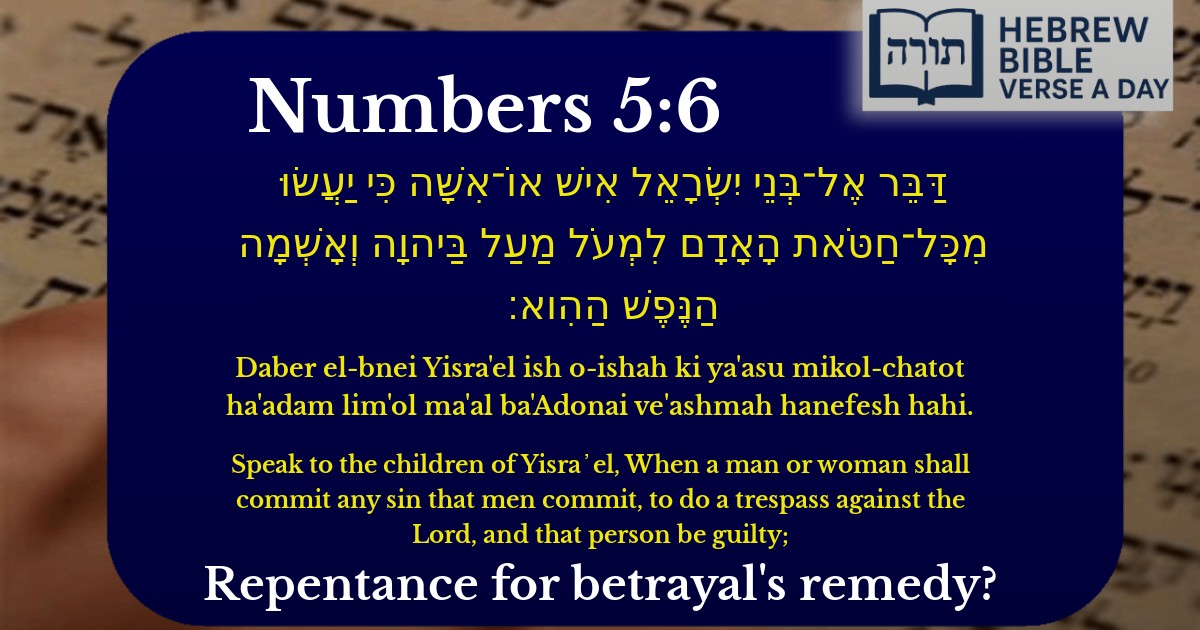Join Our Newsletter To Be Informed When New Videos Are Posted
Join the thousands of fellow Studends who rely on our videos to learn how to read the bible in Hebrew for free!
Hebrew Text
דַּבֵּר אֶל־בְּנֵי יִשְׂרָאֵל אִישׁ אוֹ־אִשָּׁה כִּי יַעֲשׂוּ מִכָּל־חַטֹּאת הָאָדָם לִמְעֹל מַעַל בַּיהוָה וְאָשְׁמָה הַנֶּפֶשׁ הַהִוא׃
English Translation
Speak to the children of Yisra᾽el, When a man or woman shall commit any sin that men commit, to do a trespass against the Lord, and that person be guilty;
Transliteration
Daber el-bnei Yisra'el ish o-ishah ki ya'asu mikol-chatot ha'adam lim'ol ma'al ba'Adonai ve'ashmah hanefesh hahi.
Hebrew Leining Text
דַּבֵּר֮ אֶל־בְּנֵ֣י יִשְׂרָאֵל֒ אִ֣ישׁ אֽוֹ־אִשָּׁ֗ה כִּ֤י יַעֲשׂוּ֙ מִכׇּל־חַטֹּ֣את הָֽאָדָ֔ם לִמְעֹ֥ל מַ֖עַל בַּיהֹוָ֑ה וְאָֽשְׁמָ֖ה הַנֶּ֥פֶשׁ הַהִֽוא׃
Parasha Commentary
📚 Talmud Citations
This verse is quoted in the Talmud.
📖 Yoma 36b
The verse is referenced in the discussion about atonement and the types of sins that require a guilt offering (asham).
📖 Keritot 2a
The verse is cited in the context of discussing the laws of sacrifices for unintentional sins and the concept of guilt (asham).


Overview of the Verse
The verse (Numbers 5:6) discusses the concept of me'ilah (מַעַל), a trespass against Hashem, committed by an individual—whether man or woman—through certain sins. The Torah emphasizes that such actions create guilt (ashmah, אָשְׁמָה) that requires atonement.
Explanation of Me'ilah (Trespass)
Rashi explains that me'ilah refers to misusing or misappropriating sanctified property, such as Temple offerings or consecrated items, for personal benefit. The Rambam (Hilchot Me'ilah 1:1) elaborates that this applies to anything dedicated to the Beit HaMikdash, and using it improperly constitutes a betrayal of Hashem's holiness.
Inclusion of Both Men and Women
The verse specifies "אִישׁ אוֹ־אִשָּׁה" (a man or a woman), indicating that the laws of me'ilah apply equally to all. The Talmud (Kiddushin 35a) derives from this that women are generally included in negative commandments unless explicitly exempted.
The Nature of the Guilt (Ashmah)
The term ashmah (אָשְׁמָה) implies both guilt and liability. The Sforno explains that the soul becomes spiritually burdened until repentance and restitution are made. The verse underscores personal accountability—each individual must rectify their wrongdoing.
Connection to Repentance and Restitution
According to the Talmud (Yoma 36a), true repentance for me'ilah requires:
Broader Ethical Lesson
The Midrash (Bamidbar Rabbah 8:1) teaches that me'ilah extends beyond Temple property—any misuse of resources entrusted to us by Hashem (such as time, talents, or material blessings) constitutes a spiritual trespass. This verse thus serves as a reminder to sanctify all aspects of life in service of the Divine.